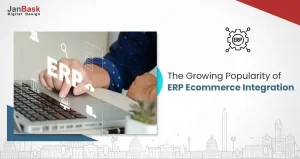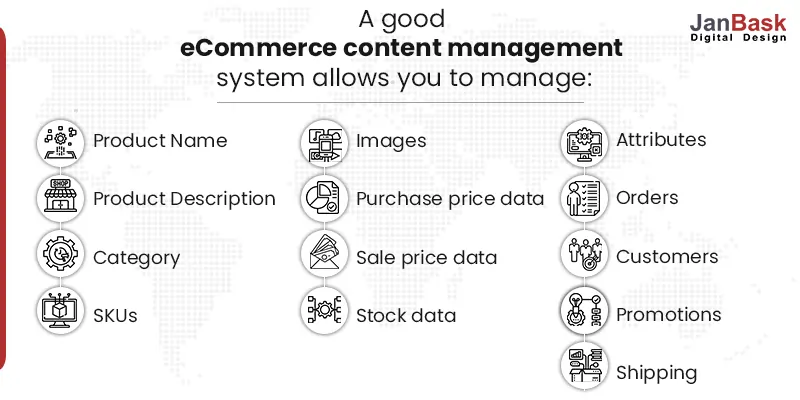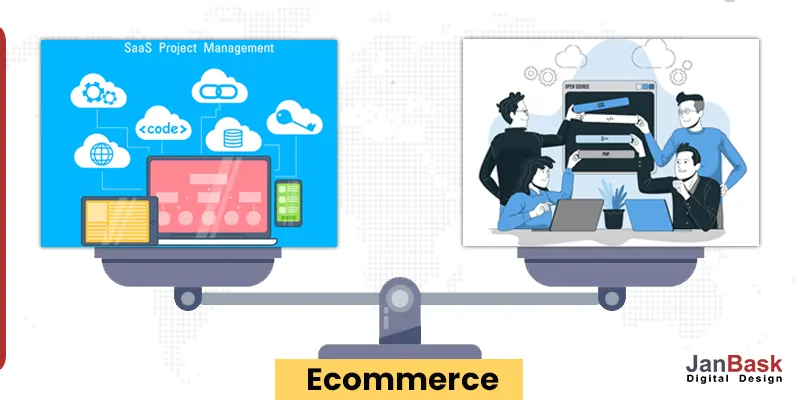
Despite widespread anxiety about the global economy, online retail sales keep rising steadily around the world. For businesses looking to launch or grow their online business, this is a golden opportunity.
To be able to reach the right customer at the right time with the right message is the pinnacle of every e-commerce professional. Unfortunately, it's easier said than done.
Most online retailers have a plethora of customer information and a growing suite of tools to sort it all out. In an ideal world, these systems would work together without a hassle, giving your digital content campaign managers a bird's-eye view of your customers.
However, learning about the e-commerce content management system options is the first step to becoming an e-commerce entrepreneur.
Many people focus solely on the store's aesthetics when planning the launch of their online stores. The look and feel of your online store must reflect your company's brand, making eCommerce web design a crucial part of developing an eCommerce site.
However, design isn't the only factor to consider in such a large project. You must also think about things like:
In this article, we will delve deeply into ecommerce CMS. We'll examine their functions, discuss whether or not you need one for your e-commerce site, explore ecommerce content management services and evaluate the best CMS for ecommerce website.
Interested in our CMS Development Solutions?

Content management systems (CMSs) are programs that let online retailers manage their websites' content without needing to know how to code. Users can alter the online shop's visual style in a number of ways, including the arrangement of individual product pages, the inclusion of promotional banners, and the speedy introduction of new website sections, all with the goal of maximizing sales.
You can manage your inventory and accept payments from customers right on your website by using an ecommerce CMS platform. There are ecommerce platforms that can also manage content. To rephrase, it is a system that allows for easy administration of an online store's backend.

When it comes to choosing an ecommerce content management systems, you have two main options- SaaS and Open Source.
There is no need for a physical server with a hosted SaaS CMS, as everything is handled in the cloud. You pay a monthly or annual fee, and in exchange, the software provider handles everything for you, including installation, upgrades, and data backups, as long as you stick to their storage recommendations. Customer service is another service typically provided by the vendor. BigCommerce, Shopify, Squarespace, and other similar platforms are examples of hosted content management systems.
With an open-source e-commerce CMS platform, the website's features can be modified at will by the site's visitors. Open-source software is frequently self-hosted and available for free download. As a result, it is up to the store's administrators to figure out where their website will be hosted, take care of the server, and update the site's software as needed.
While some open-source platforms do offer cloud hosting, they differ from software as a service (SaaS) in that store owners must still perform maintenance. WooCommerce and Magento are two well-known examples of open source e-commerce software.

Does the idea of making changes to your site's content fill you with dread? One of the best features of today's CMS is that it's easy to use and doesn't necessitate any specialized knowledge or training. This means that you and your team can quickly and easily manage all content and product updates on your own, allowing you to move marketing campaigns and promotional activities forward.
Successful online retailers understand that meeting and exceeding customer expectations is key to expanding their businesses. However, if you go through a middleman, you won't be able to move at the speed and agility necessary to keep your website's content fresh.
You can update the site on your own and save money by using a content management system (CMS). When you outsource development, you not only save time, but you also free up resources that can be redirected to other marketing efforts that will help your business grow.
In order to attract organic visitors, content marketing should be one of your top priorities.
Nowadays, no e-commerce company can afford to be silent on platforms like Twitter, Facebook, and Instagram. If you want more people to see your store on search engines, then you need to create content that is both interesting and useful. Producing content that people can't stop watching is another foolproof method of establishing a strong brand and fostering customer loyalty. These days, that's how most shoppers operate.
With the help of a good CMS, you can make sure that your content is neatly filed, easily accessible, and shareable by all. And it accomplished that with minimal administrative intervention.
Successful projects are always team efforts. It takes a lot of work to create high-quality content, from proofreading to formatting to sourcing appropriate visual assets. Streamlining the content creation process requires that you and your team be able to work together effectively.
And a well-selected CMS for e commerce can get everyone on the same page, with authors able to do their work within the system itself and take advantage of clever tools to hone their articles. In turn, this enables more relevant content, more streamlined evaluation procedures, and a more refined end-user experience.
If you are new to this, you can consider hiring. A content management company provides varied services in the form of writing, editing, and publishing content.
Content management systems (CMS) are widely regarded as the best eCommerce option for any company. The system is adaptable, easy to use, and scalable, making it suitable for businesses of all sizes (small businesses, mid-market, and enterprises). Online shop owners will find it much simpler to manage the content on their sites with this tool.
In a matter of seconds, administrators can upload any type of file or data using the system's intuitive interface. Optimizing content in a CMS is not a complicated process.
With a CMS, incorporating content into your website is a quick and painless process. Web content management systems (CMSs) allow for the seamless integration of dynamic web content, allowing for information to be updated and published on demand.
A content management system's universal accessibility stems from the fact that its user interface is typically browser-based. To manage the system, administrators need only access it from an Internet-connected computer. A standout feature of CMS is that it allows business owners to work remotely, allowing them to achieve their goals regardless of where they happen to be at any given time.
E-commerce sites that put content first benefit greatly from increased organic traffic. This lowers acquisition costs and aids e-commerce sites in fostering a devoted following. With the help of sophisticated on-page SEO tools and other user-friendly content features, business owners can increase their chances of making a sale, learn more about their customers' tastes, and concentrate on meeting those needs.
Here are 15 eCommerce SEO strategies that will help you get started.
Investing in strategic content marketing and demand generation is a sensible move. Still, it's important to guarantee that the online storefront is optimized for performance and prepared to expand. E-commerce platforms have superior features, so you won't have to stress over things like shipping, payments, and synchronized inventory across multiple sales channels. In this way, you can expand your company without worry.
The success of your company depends on the safety of its payment system. Integrating with industry-standard payment gateways is yet another benefit of having ecommerce features built into your CMS's backend, which can do wonders for building customer confidence in your company. Even better, integrating two systems takes no more than a click or two.
A successful eCommerce project requires a deep understanding of the customer, and the ability to translate that knowledge into a compelling online experience. Here is our free guide for ecommerce lead generation that you don’t want to miss!
There is a wide variety of content management systems (CMS) available for online stores, making it hard to settle on a single solution. All you need to do is choose a CMS software company will provide a fast, robust and flexible framework for developing compelling website.
BigCommerce is a robust e-commerce platform with a wide range of out-of-the-box features and content management system (CMS) capabilities, making it suitable for businesses of all sizes and stages of development. Every facet of the e-commerce industry is covered.
BigCommerce's shopping cart can be used in tandem with other popular content management systems, thanks to the platform's sophisticated SEO integration and adaptable APIs. BigCommerce is a hosted e-commerce platform that is PCI compliant at the Level 1 level and can be accessed on a monthly subscription basis.
WordPress is the most popular content management system (CMS), but it is not an e-commerce solution. You'll require the WooCommerce plugin to turn your WordPress site into a functional online store.
The open-source WooCommerce platform is widely used because of its wide availability of free themes and extensions. These extensions are great because they make it simple to add in much-needed capabilities to the core WooCommerce product with just a single click.
These extensions are great because they make it simple to add in much-needed capabilities to the core WooCommerce product with just a single click.
Joomla is yet another free and open-source CMS that can be used to create and publish websites. While e-commerce isn't built into Joomla, it can be added with a few clicks using one of the many available free extensions.
Sitecore combines design and editing tools with content management, e-commerce, marketing automation, and personalization to create a powerful digital experience platform. Merchants can create digital storefronts and provide customers with individualized shopping experiences on this platform.
Magento is widely used as a content management system ecommerce for online shops. Adobe owns it, so you know it must be good if it's used by over 260,000 online stores around the world. Magento's robust features and extensive extension marketplace make it ideal for enterprise-level applications such as customer relationship management (CRM), enterprise resource planning (ERP), chatbots, and more. However, due to its complex setup, pricing options, and development needs, it is most popular with rapidly expanding and larger businesses.
Shopify is a popular cloud-based shopping cart. This e-commerce platform has quickly gained popularity among new and small businesses due to its user-friendly design and low costs. But that doesn't mean major corporations can't make use of the CMS. Reviewing the list of available features is a good idea before committing to a plan because the number of available features varies depending on the type of plan selected.
Shopify provides unlimited free help from their knowledgeable staff, a wide variety of free storefront layouts, and a stand-alone point-of-sale system. However, if you want to accept payments from sources other than Shopify, you'll have to pay transaction fees to Shopify.
OpenCart is another free and flexible open-source content management system for ecommerce. It has a thriving plugin market and a wide variety of premade themes for quick deployment. OpenCart supports over twenty different payment gateways and eight shipping options. Since there are no recurring costs associated with using this content management system for online stores, it's a great choice for startups on a tight budget.
If you are looking for tips to market your ecommerce website under budget, this is the guide that will help you a lot.
Wix is the most popular drag-and-drop website builder used by businesses today. Website owners can add the commerce module if they need it, but it isn't designed as an ecommerce CMS.
Wix is a great option for those with no coding experience or who simply prefer a no-code approach, thanks to its extensive library of premade themes and in-built tools. It may be feasible if your product line is small and you need to launch your company rapidly. Don't forget that once you've settled on a storefront layout, it can't be altered.
When it comes to content management systems and marketing automation, HubSpot is in a league of its own. Although it lacks e-commerce features, it is easily integrated with BigCommerce and Shopify, two of the most popular and widely used e-commerce platforms. You can learn more about your customers' habits, streamline your marketing efforts, and keep tabs on your revenue streams with the help of HubSpot by linking the two together.
With a content management system, you can publish and maintain content with ease. Our content management system services make the creation, editing, and management of web content more effective, efficient and scalable for any organization.
Website quality is crucial in today's competitive e-commerce market.
Developing a visually appealing e-commerce site is a breeze with a good content management system. We hope that after reviewing our selection of the best ecommerce CMSs, you have a better idea of where to start.
It's important to keep in mind that consumers have come to expect excellent digital experiences, innovative product displays, and genuine brand values from businesses of all sizes, regardless of whether those values are communicated through an e-commerce or content-first approach. To achieve your goals, you should incorporate storytelling into your sales strategy.
Over the past two decades, we have provided content management services to a wide range of clients from Fortune 500 companies to small businesses and nonprofits. We are committed to satisfying customers with quality work and outstanding customer service. Feel free to contact us for a discussion.
Get your Content Management by our Premium Solutions?

K
I have heard so many times that your teams article are just mind blowing. We are especially enjoyed the Ecommerce Content Management System. My friend shared me this awesome article. But, after seeing you I realized that writing can be a better option, too.
A
I must say that the article your team wrote on Ecommerce Content Management System was truly exceptionally magnificent. The way your team explain all complex topic in an easy-to-understand way is really impressive I’m just speechless. Thanks for sharing this with us.
T
I have just finished reading the article you wrote on Ecommerce Content Management System. I want to tell you how much I appreciated your clearly written and thought-provoking article. Thank you for your thorough research and clear writing. Hats off for this content.
B
This is fascinating informative topic of the Ecommerce Content Management System. Your team are such a motivated worker. What terrific skills your team are showing. This is some awesome thinking. My goodness, how impressive. Lots of love. Thank you for sharing with us.
C
While much has been written on this topic of Ecommerce Content Management System, your article expresses both the positive and negative aspects of this important topic. I just love your tone of writing. It’s so straightforward to understand. Just a fan of your ideas.